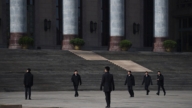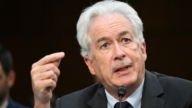【新唐人2013年03月26日訊】在3月24號的「中國發展高層論壇2013」年會上,「北京大學」經濟系教授張維迎,向發改委副主任朱之鑫連番「開砲」,質疑目前中共政權實施的產業政策,並沒有使相關企業良性發展,還導致產能過剩等一系列問題。張維迎轟發改委:「過去十年只關注發展,不太關注改革」。
張維迎的提問贏得現場兩次熱烈掌聲。他說,最近中國的「光伏產業」處於嚴重危機當中,領頭企業「無錫尚德」已經處於破產程序。而在過去十多年,從中央政府到地方政府,以產業政策的名義,給這個行業和這些企業大量的資金和其他方面的支持。
張維迎認為,產業政策已經成為「腐敗和尋租」的重要根源。
「北京天則經濟研究所」副所長馮興元表示,當局的產業政策,就是先選定一些產業優先發展,然後提供補貼項目。
北京天則經濟研究所副所長馮興元:「產業政策因為是政府控制資源,控制投資方向,有時候政府自己投資,或者扶植其他企業去投資,包括政府控制很多基金,我們把它叫做『設租』,其他人就可以為了要項目,就可以尋租。企業也好,地方政府也好,肯定是腐敗滋生的一個很大的來源。」
馮興元認為,這種所謂「產業傾斜政策」卻是反競爭的行為,對市場常常造成負面效果。
馮興元:「產業政策對於獲得補貼者,它可能是一種特權。對於沒有獲得補貼者,都是沒有享受到特權,實際上競爭不平等。尤其是中國傾向於促進龍頭企業發展,等於是產業裡邊帶頭的企業,拿到的國家項目補貼多,或者享受稅收優惠,那是反競爭的行為。」
馮興元還表示,最近中共調整煤礦產業,讓溫州的煤礦礦主退出江西的煤礦業,等於國營的煤礦業把溫州的煤炭業地盤據為己有。馮興元說,這裡面肯定會出現很大的腐敗。
馮興元還指出,經濟學家尼斯坎南有一個模型叫「預算最大化官僚」,就是﹕官僚都喜歡預算大,自己控制著錢,然後全部花掉。
馮興元說,中共老想控制資源,搞國有企業投資,或自己控制資源來花費。尤其是發改委控制了很多產業基金,他認為,這是個人的私心在作怪。
馮興元:「如果是高新技術產業促進,用私人資本的引入,要遠遠好於財政投入。像私募基金,他們是專業團隊,他們識別投資項目,識別技術,他們的能力非常強,遠遠高於政府。」
馮興元表示,無論是維護舊有的經濟結構,還是扶植創新的產業,中共當前的產業政策都是弊病多多,失敗多於成功。
如:當局對那些可能要被淘汰的夕陽產業提供補貼,原本那些虧損的行業,由於政府的補貼卻維護了下來。馮興元說,維護舊有結構的產業政策,實際上是維護了舊有低的生產率。
而在扶植創新行業這方面,馮興元認為:中共往往盲目的提供補貼。
張維迎在提問當中說,發改委全名叫「發展與改革委員會」,但是發改委過去十年,其實只關注發展,不太關注改革。但大部分權力都在發改委手裡。他詰問發改委決定怎麼放權?發改委自身怎麼去改革?
張維迎還指出,目前中國有很多產業出現產能過剩問題。他質問朱之鑫﹕會不會重新反思產業政策﹖把重點放在怎麼創造更好的公平環境,而不是讓某些產業和某些企業,利用財政的錢對他們進行補貼。
朱之鑫在回答提問時,婉轉否認發改委造成產能過剩、滋生腐敗以及改革停滯,他宣稱中國有中國的特色和道路。但他又表示,「要有更大的政治勇氣和智慧」來面對這些問題。
採訪編輯/秦雪 後製/鍾元
Chinese Economist Criticized National Development and Reform Commission
On March 24th the annual meeting of
“China Development Forum 2013” was held in Beijing.
Zhang Weiying, Professor of Economics Department of Peking
University, continuously raised questions at the meeting.
Zhang questioned Zhu Zhixi, vice director,
National Development and Reform Commission (NDRC),
on why the current industrial policy didn’t make
enterprises run better. On the contrary,
it resulted in a series of problems, such as over capacity.
Zhang said: “in the last decade, NDRC only concentrated on
the development, but not the reform.”
Zhang said that recently the photovoltaic industry in China
was facing serious crisis.
The leading company “Suntech Power Holdings” started
bankruptcy proceedings.
In the last decade, the central and local governments provided
a large amount of money to this industry and related companies.
They also gave other support, under the name “industrial policy”.
Zhang believes that “industrial policy” became the leading
cause of corruption.
Feng Xingyuan, deputy director of Bejing Uni-rule Institute
of Economics made comments.
Feng said the current industrial policy strategy is to launch
selective projects, develop them first, later create subsidy projects.
Feng Xingyuan: “For industrial policy, the government
controls resources and gives investment guidelines.
Sometime the government makes investment,
sometimes supports other firms to invest.
The government controls many funds; we call it “rent-setting”.
In order to get the project, people will take rent-setting.
No matter it is an enterprise or a local government,
they are certainly creating a great source of corruption.”
Feng believes that the so-called “industry preferential
policies” are actually anti-competitive.
They resulted in negative impact on the market.
Feng Xingyuan: “Industrial policy” could become
a privilege for subsidy winners.
However, those who don’t win subsidies also won’t have
Privileges. Actually, it’s inequality of competition.
Also promoting the leading firms is in the government’s
favor, so leading companies will receive the most subsidies.
The leading enterprises enjoy the Tax Preference,
which is an anti-competitive behavior.”
Feng also said that the Chinese Communist Party (CCP)
recently reorganized the coal mining industry.
They forced coal mine bosses in Wenzhou to leave the coal
mine business from the coal industry in Jiangxi Province.
It means the state-owned coal business took Wenzhou’s
company over for itself.
Feng said that there is bound to be a lot of corruption.
Feng pointed out that economist Niskanen created the
“budget-maximizing model”.
It means bureaucrats like to have a large budget,
then control the money and spend it all.
Feng said the CCP always wants to control the resources,
invest in state-owned business, or control resources and spend it.
Especially NDRC controls many funds, this is selfish behavior.
Feng Xingyuan: “Promoting high-tec industries and
introducing private capital will be far better than CCP investment.
For example, for private equity funds, they are an expert team,
they can sense the right project and skills.
They are very capable, and are
far better than the government.”
Feng said that whether maintaining the existing economic
structure or promoting innovative industry,
the CCP’s industrial policies have many disadvantages,
with more failure than success.
E.g. the CCP provided compensation to those declining
industries which were underperforming.
However, due to the compensation, they survived.
Feng said that maintaining existing industrial policy,
is actually maintaining the existence of low productivity.
Feng believes that in the area of promoting innovative
industry, the CCP often blindly provides compensation.
Zhang Weiying said in his question that NDRC’s full name
is “Development and Reform Commission”.
However, over the past decade, NDRC only focused on
development, not concerned with the reform part.
In addition, NDRC has the most power.
Zhang asked NDRC how they plan to release the power.
How does NDRC itself reform?
Zhang also pointed out that in China,
Excess Capacity exist in many industries.
Zhang asked Zhu Zhixi: “Will you re-think industrial policy
to focus on how to create a fair better environment?
Rather than using fiscal money to subsidize some
declining industries and businesses?”
In response to the questions, Zhu tactfully denied saying NDRC
has made Excess Capacity, corruption and reform stagnation.
Zhu claimed that China has its own character and path.
Yet he also said they “need even more political courage
and wisdom” to face these problems.

























